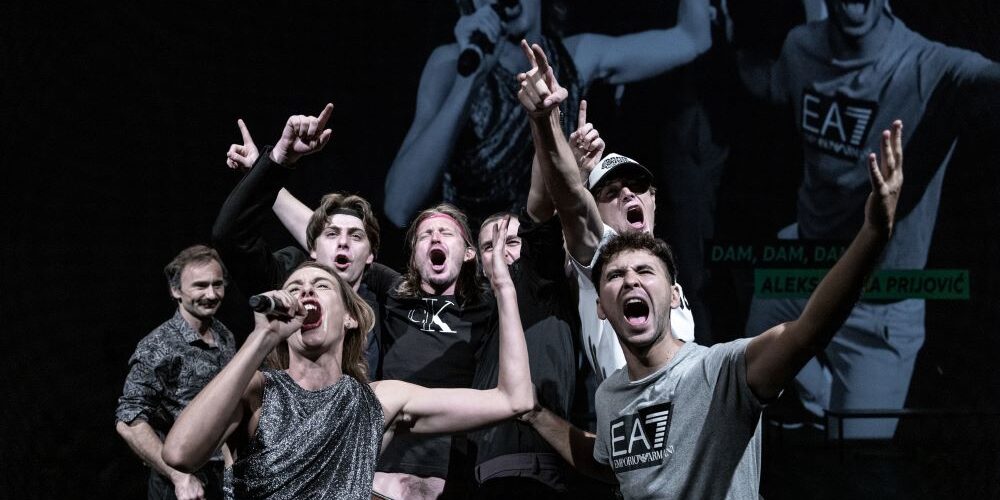Zagreb Youth Theatre (ZKM), presented as part of the 65th International Theatre Festival MESS in Sarajevo
“There are a whole lot of words for fucking, but only one for love,” concludes the psychoanalyst. The patient she addresses so nonchalantly is dressed in a neon-green football jersey, his hair slicked back into a ponytail. He looks at her, puzzled, watching her red-painted lips move so swiftly. Only then does he answer, defensively: “Jebanje, karanje, drkanje, tucanje, kresanje… that is the language of the football boot.”
The eponymous play, written by football player Ivan Ergić and playwright Filip Grujić, tells the story of David Polovina—a fictitious wunderkind whose path leads him from NK Lokomotiva Zagreb to the prestigious VfL Wolfsburg. But success comes at a price. What at first appears to be a football fairy tale soon reveals itself as a double-edged sword. Instead of fame, wealth, and excitement, Polovina encounters something else. The obsession with competition and the idolization of success foster an environment that strips the athlete of his humanity, turning him into an object—mere property acquired by a Bundesliga club. This forms the premise of The Language of the Football Boot that exposes the unseen sides of professional sports, highlighting the immense pressure and expectations that often lead to isolation and depression.
Even though the play intertwines football and masculinity with the complex subjects of capitalism and mental health, the multi-award-winning Zagreb Youth Theatre production, directed by Borut Šeparović, succeeds in presenting them in a comedic yet impactful manner. Through a visual language rooted in choreography and multimedia imagery, Šeparović constructs a fluid, multilayered space that invites multiple perspectives on the unfolding story. Four cameras, positioned at different angles, capture the action both in close-up and from a distance, their footage projected onto one large screen and three smaller ones. The effect recalls Rashomon—a mosaic of viewpoints that exposes the story’s inherent subjectivity.
More than that, the screens also signal changes in location. In this way, the story of David Polovina moves seamlessly from the dressing room of VfL Wolfsburg and the football field, to nightclubs pulsing with turbofolk music, back to his parents’ home in Zagreb—which, almost needless to say, he finances with his earnings—and finally to the office of a psychoanalyst. Nothing on stage ever stands still. As soon as the merciless coach enters the dressing room, it’s time for the next training session. At his command, the lighting shifts to a soft yellow, and a waltz begins to play softly, allowing the soles of the football boots to squeak sharply against the stage parquet as the players do their squats, push-ups, and other drills.
It is precisely this contrast between the harshness of the football cosmos—with all its exploitation, competitiveness, and psychological strain—and the playfulness of Šeparović’s direction that makes the performance so memorable. But above all, it is the ensemble’s performance that makes the piece extremely entertaining and even touching sometimes.
Bernard Tomić plays the ups and downs of the main character Polovina wholeheartedly, giving a nuanced and emotionally engaging performance. Rakan Rushaidat, as Ljubomir “Ljubo” Polovina, portrays a kind of obliviousness that, while baffling, is easy to forgive—especially since his cluelessness and charm provide the audience with the most laughter. Ugo Korani, on the other hand, relies on impeccable timing and uncompromising dedication. In his portrayal of Slaven, he struggles against his emotions, revealing a tension that keeps the audience fully invested. Further praise is due to Anđela Ramljak, who manages to shine with wit and precision in multiple roles—Milica (Mica) Jovanović, the gold-digging sponsor, assistant coach, and teammate Jessica Kowalski.

The Language of the Football Boot. Photos: Jelena Janković
Meanwhile, the large screens above them display the rising heart rates of the performers, as if a fitness app were projected onto the stage. What appears on the screens are not the heart rates of fictional players, but those of the actors themselves. The names displayed above—Tomić, Korani, Ramljak, and others such as Pašalić, Medvešek and Živolić—emphasize the human effort behind them: they strain, drill, and sprint across the stage until real exhaustion takes over, sweat glistening and dripping down their chins.
The significance of this alienation effect becomes strikingly apparent: while the actors are still working out, clearly exhausted, the music stops and the auditorium lights suddenly come on. On screen, a simple analogy appears, comparing the value of a stage worker’s labour to that of a football player and highlighting the pay gap between them. This is not merely a digression—it is perhaps the central theme and purpose of the performance: to shed light onto the enormous pressure to perform affects not only professional athletes but cultural workers as well.
The Language of the Football Boot—which represents the endless ways to say “fucking in the dressing room”—is not just a way of speaking, but a way of living. The characters on stage are storybook stereotypes whose primary role is to convey and embody this lifestyle. As introduced by the coach, David’s teammates, and others, the audience is invited to explore the philosophy of the dressing room. Wisdom such as “Never drive a car more expensive than the coach’s” or “There’s only one rule in the dressing room: never mess with those who have a small dick” elicit gales of laughter from the auditorium.
But this is exactly where it gets tricky: the characters are deliberately two-dimensional, emphasizing stereotypes rather than psychological depth. Especially during the second interval—at halftime of the 165-minute performance—it becomes challenging to take these same characters seriously when addressing subjects like mental health, personal responsibility, or the pressures of professional sports. One might argue, however, that this is precisely what the authors intended, as the exaggeration mirrors reality in a slightly distorted, comedic way. Yet the issue does not lie in what the play is saying, but in how it says it. Take, for example, Slaven: he repeats the same self-serving clichés and absurd routines, highlighting the shallow yet comically recognizable logic of the dressing room. Ultimately, what lingers after the performance is the entertainment and joy of the evening, rather than the social point it clearly aims to make.
All in all, The Language of the Football Boot is a clever and ambitious concept, blending comedy, sports, and cultural commentary. While the social critique advanced in the second half is overshadowed, the production succeeds in creating a lively, humorous, and visually engaging theatrical experience—if not full immersion in the intended critique.
Credits
Director/dramaturge: Borut Šeparović//Writers: Filip Grujić and Ivan Ergić//Assistant dramaturge: Filip Rutić//Choreographer: Tamara Despot// Set design, video and multimedia: MONTAŽSTROJ (Matija Blašković, Konrad Mulvaj and Borut Šeparović)//Costume design: Marta Žegura//Music: Borut Šeparović//Sound design: Jan Kozumplik//Light design: Aleksandar Čavlek and Saša Bogojević//Stage manager: Milica Sinkauz//
Cast: Bernard Tomić, Ugo Korani, Rakan Rushaidat, Lucija Šerbedžija, Nikolina Prkačin, Anđela Ramljak, Hrvojka Begović, Barbara Prpić, Zoran Čubrilo, Vedran Živolić, Ivan Pašalić, Toma Medvešek, Viktor Lovinčić, Marin Plećaš and participants of the ZKM Academy
For tickets and more information, visit: ZeKaEm.hr
Berina Musa is a writer, dramaturg, and critic based in Sarajevo and Freiburg. She studied German linguistics, literary studies, and art history at the University of Freiburg and is currently completing a second degree in dramaturgy at the Academy of Performing Arts in Sarajevo. Her plays and short films have been presented at the Bosnian National Theatre Zenica, MESS, the Sarajevo Film Festival, and the Mostra Internazionale del Nuovo Cinema di Pesaro.








